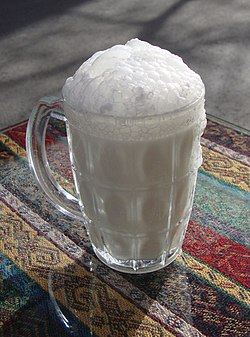This is an old revision of this page, as edited by Fleetham (talk | contribs) at 01:07, 27 June 2015 (Undid revision 668734146 by 212.252.155.103 (talk)). The present address (URL) is a permanent link to this revision, which may differ significantly from the current revision.
Revision as of 01:07, 27 June 2015 by Fleetham (talk | contribs) (Undid revision 668734146 by 212.252.155.103 (talk))(diff) ← Previous revision | Latest revision (diff) | Newer revision → (diff) Fresh susurluk ayranı with a head of froth Fresh susurluk ayranı with a head of froth | |
| Alternative names | Laban, Doogh, katık, qeshk |
|---|---|
| Type | Dairy product |
| Course | Beverage |
| Place of origin | Turkic Central Asia |
| Created by | Turkic people |
| Serving temperature | Cold |
| Main ingredients | Yogurt, water |
Ayran is a cold yogurt beverage mixed with salt. In addition to Turkey, where it is considered a national drink, ayran can be found in other neighboring regions.
Its primary ingredients are water and yogurt, and ayran has been variously described as "diluted yogurt" and "a most refreshing drink made by mixing yogurt with iced water".
Ayran is served chilled and often as an accompaniment to grilled meat or rice especially during summer.
Similar beverages include the Iranian doogh, but yogurt drinks are popular beyond the Middle East region—ayran has been likened by some to the South Asian lassi.
History
Ayran is a traditional Turkish drink and was consumed by nomadic Turks prior to 1000 CE. Others think ayran was first developed thousands of years ago by the Göktürks, who would dilute bitter yogurt with water in an attempt to improve its flavor.
Contemporary ayran
Ayran is ubiquitous in Turkey and offered at almost all places that serve drinks, including fast-food restaurants, such as McDonald's and Burger King.
The town of Susurluk is well known in Turkey for its ayran, which characteristically has a foamy head and creamy taste.
-
McDonald's ayran
Etymology
Some Turkish language dictionaries state the word ayran derives from Old Turkish for buttermilk.
See also
Similar beverages
References
- A. Y. Tamime (ed.) (2008). Fermented Milks. John Wiley & Sons. p. 124. ISBN 9781405172387.
{{cite book}}:|author=has generic name (help) - For popularity in Armenia, Iran, Azerbaijan, Kazakhstan, and Kyrgyzstan see Yildiz Fatih (2010). Development and Manufacture of Yogurt and Other Functional Dairy Products. CRC Press. p. 10. ISBN 9781420082081.
For the Balkans, see Leslie Strnadel, Patrick Erdley (2012). Bulgaria (Other Places Travel Guide). Other Places Publishing. p. 58. ISBN 9780982261996.
- For use in Afghanistan by Kirghiz, see Nazif Shahrani, M. (2013). The Kirghiz and Wakhi of Afghanistan. 9780295803784: University of Washington Press. pp. 92–93.
{{cite book}}: CS1 maint: location (link) - For Lebanon, see A. Y. Tamime (ed.) (2008). Fermented Milks. John Wiley & Sons. p. 96. ISBN 9781405172387.
{{cite book}}:|author=has generic name (help) - For presence in the North Caucasus, see Smih, Sebastian (2006). Allah's Mountains: The Battle for Chechnya. Tauris Parke Paperbacks. p. 25. ISBN 9781850439790.
- For use in Afghanistan by Kirghiz, see Nazif Shahrani, M. (2013). The Kirghiz and Wakhi of Afghanistan. 9780295803784: University of Washington Press. pp. 92–93.
- ^ Turkish Delights Nevin Halici Gastronomica: The Journal of Critical Food Studies, Vol. 1, No. 1 (Winter 2001), pp. 92-93 Published by: University of California Press Article DOI: 10.1525/gfc.2001.1.1.92
- Lake Van and Turkish Kurdistan: A Botanical Journey P. H. Davis The Geographical Journal, Vol. 122, No. 2 (Jun., 1956), pp. 156-165 Published by: The Royal Geographical Society (with the Institute of British Geographers) Article DOI: 10.2307/1790844
- "Turkish Buttermilk". www.kultur.gov.tr. Ministry of Culture and Tourism, Turkey. Retrieved 5 October 2013.
- Gina Husamettin. "Ayran – Turkish national beverage". balkon3.com. Retrieved 5 October 2013.
- Yildiz Fatih (2010). Development and Manufacture of Yogurt and Other Functional Dairy Products. CRC Press. p. 10. ISBN 9781420082081.
- Heyhoe, Kate. The ABC's of Larousse Gastronomique : ayran
- Yildiz Fatih (2010). Development and Manufacture of Yogurt and Other Functional Dairy Products. CRC Press. pp. 123 & 125. ISBN 9781420082081.
- For ayran at Turkish McDonalds, see "İçecekler: Ayran (250 ml)". McDonalds Turkey. Anadolu Restoran İşletmeleri Ltd. Şti. Retrieved 6 August 2013.
- For ayran at Turkish Burger King, see "İçim Ayran - Burger King Sultan Menü". Burger King Turkey. Retrieved 6 August 2013.
- "Fame of foamy ayran goes beyond borders". Hürriyet Daily News. Hürriyet - Doğan Yayın Holding. Retrieved 7 January 2014.
- "City Guide > Balıkesir > Don't Leave Without". kultur.gov.tr. Ministry of Culture and Tourism, Turkey. Retrieved 5 October 2013.
- "Ayran". EtimolojiTurkce.com. Tehlif Hakları. Retrieved 31 August 2014.
- Notes
- Ayran is present in the Balkans, some CIS countries, and the Middle East. Countries and regions where ayran has been reported include: Afghanistan, Armenia, Azerbaijan, Iran, the Balkans, Kazakhstan, Kyrgyzstan, Lebanon, and the North Caucasus.